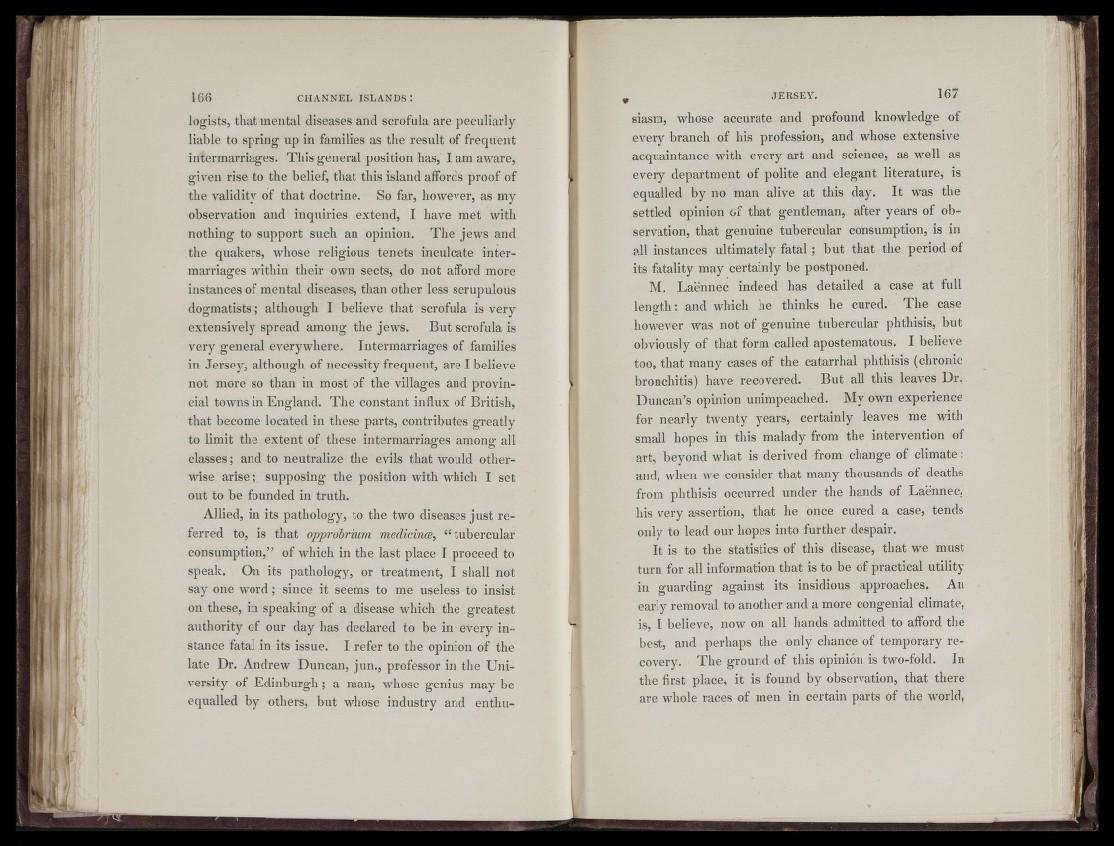
•I
i: V
iíA
logists, that mental diseases and scrofula are peculiarly
liable to spring up in families as the result of frequent
intermarriages. This general position has, 1 am aware,
gi\"en rise to the belief, that this island affords proof of
the validity of that doctrine. So far, however, as my
observation and inquiries extend, I have met with
nothing to support such an opinion. The jews and
the quakers, whose religious tenets inculcate intermarriages
within their own sects, do not afford more
instances of mental diseases, than other less scrupulous
dogmatists; although I believe that scrofula is very
extensively spread among the jews. But scrofula is
very general everywhere. Intermarriages of families
in Jersey, although of necessity frequent, are I believe
not more so than in most of the villages and provincial
towns in England. The constant influx of British,
that become located in these parts, contributes greatly
to limit the extent of these intermarriages among all
classes; and to neutralize the evils that would otherwise
arise; supposing the position with which I set
out to be founded in truth.
Allied, in its pathology, to the two diseases just referred
to, is that opprobrium medicincB, “ tubercular
consumption,” of which in the last place I proceed to
speak. On its pathology, or treatment, I shall not
say one word ; since it seems to me useless to insist
on these, in speaking of a disease which the greatest
authority of our day has declared to be in every instance
fatal in its issue. I refer to the opinion of the
late Dr. Andrew Duncan, jim., professor in the University
of Edinburgh; a man, whose genius may be
equalled by others, but whose industry and enthusiasm,
whose accurate and profound knowledge of
every branch of his profession, and whose extensive
acquaintance with every art and science, as well as
every department of polite and elegant literature, is
equalled by no man alive at this day. It was the
settled opinion oi' that gentleman, after years of observation,
that genuine tubercular consumption, is in
all instances ultimately fatal ; but that the period of
its fatality may certainly be postponed.
M. Laennec indeed has detailed a case at full
leno'th: and which he thinks o he cured. The case
however was not of genuine tubercular phthisis, but
obviously of that form called apostematous. I believe
too, that many cases of the catarrhal phthisis (chronic
bronchitis) have recovered. But all this leaves Dr.
Duncan’s opinion unimpeached. My own experience
for nearly twenty years, certainly leaves me with
small hopes in this malady from the intervention of
art, beyond what is derived from change of climate:
and, when we consider that many thousands of deaths
from phthisis occurred under the hands of Laennec,
his very assertion, that he once cured a case, tends
only to lead our hopes into further despair.
It is to the statistics of this disease, that we must
turn for all information that is to be of practical utility
in guarding against its insidious approaches. An
early removal to another and a more congenial climate,
is, I believe, now on all hands admitted to afford the
best, and perhaps the only chance of temporary recovery.
The ground of this opinion is two-fold. In
the first place, it is found by observation, that there
are whole races of men in certain parts of the world,
• li'i
I:
I
M
/X'l